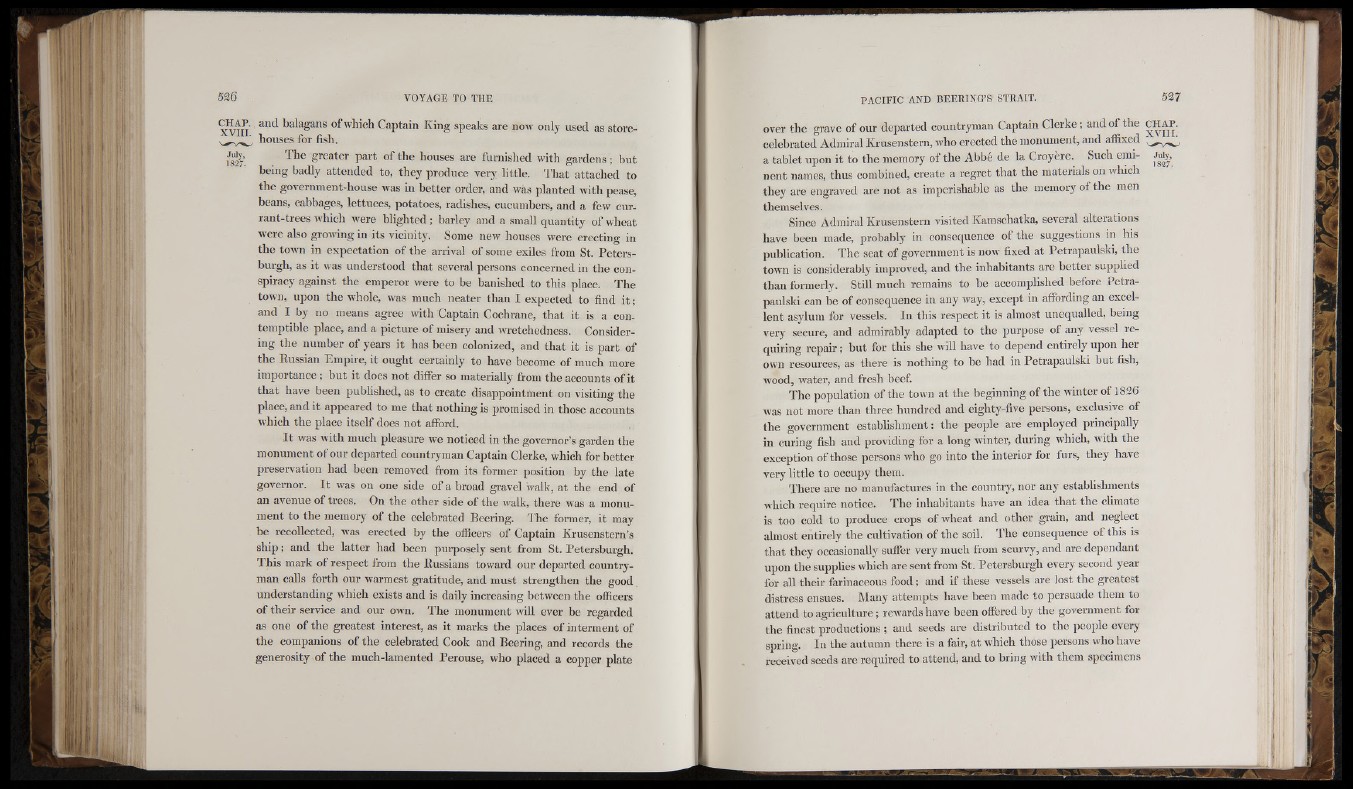
il!
7 ;
Il
vk’r i ' 'lalagai’S of which Captain King speaks are now only used as storehouses
for fish.
im to'’*“ greater part of the houses are furnished with gardens; but
being badly attended to, they produce very little. That attached to
the government-house was in better oi-der, and was planted with pease,
beans, cabbages, lettuces, potatoes, radishes, cucumbers, and a few currant
trees which were blighted; barley and a small quantity of wheat
were also growing in its vicinity. Some new houses were erecting in
the town in expectation of the arrival of some exiles from St. Peters-
burgh, as it was understood that several persons concerned in the conspiracy
against the emperor were to be banished to this place. The
town, upon the whole, was much neater than I expected to find i t ;
and I by no means agree with Captain Cochrane, that it is a con-
temptible place, and a picture of misery and wretchedness. Considering
the number of years it has been colonized, and that it is part of
the Eussian Empire, it ought certainly to have become of much more
importance ; but it does not differ so materially from the accounts ofit
that have been published, as to create disappointment on visiting the
place, and it appeared to me that nothing is promised in those accounts
which the place itself does not afford.
It was with much pleasure we noticed in the governor’s garden the
monument of our departed countryman Captain Clerke, which for better
preservation had been removed from its former position by the late
governor. It was on one side of a broad gravel walk, at the end of
an avenue of trees. On the other side of the walk, there was a monument
to the memory of the celebrated Beering. 'I'he former, it may
be recollected, was erected by the officers of Captain Krusenstern’s
ship; and the latter had been purposely sent from St. Petersburgh.
This mark of respect from the Kussians toward our departed countryman
calls forth our warmest gratitude, and must strengthen the good
understanding which exists and is daily increasing between the officers
of their service and our own. The monument will ever be regarded
as one of the greatest interest, as it marks the places of interment of
the companions of the celebrated Cook and Beering, and records the
generosity of the much-lamented Perouse, who placed a copper plate
over the gi-ave of our departed countryman Captain Clerke; and of the C H A P .
celebrated Admiral Krusenstern, who erected the monument, and affixed
a tablet upon it to the memory of the Abbé de la Croyère. Such eminent
names, thus combined, create a regret that the materials on which
they are engraved are not as imperishable as the memory of the men
themselves.
Since Admiral Krusenstern visited Kamsehatka, several alterations
have been made, probably in consequence of the suggestions in his
publication. The seat of government is now fixed at Petrapaulski, the
town is considerably improved, and the inhabitants are better supplied
than formerly. Still much remains to be accomplished before Petra-
paiilski can be of consequence in any way, except in affording an excellent
asylum for vessels. In this respect it is almost unequalled, being
very secure, and admirably adapted to the purpose of any vessel requiring
repair ; but for this she will have to depend entirely upon her
own resources, as there is nothing to be had in Petrapaulski but fish,
wood, W'ater, and fresh beef
The population ofthe town at the beginning of the winter of 1826
was not more than three hundred and eighty-five persons, exclusive of
the government establishment: the people are employed principally
in curing fish and providing for a long winter, during which, with the
exception of those persons who go into the interior for furs, they have
very little to occupy them.
There are no manufactures in the country, nor any establishments
which require notice. The inhabitants have an idea that the climate
is too cold to produce crops of wheat and other grain, and neglect
almost entirely the cultivation of the soil. The consequence of this is
that they occasionally suffer very much from scurvy, and are dependant
upon the supplies which are sent from St. Petersburgh every second year
for all their farinaceous food ; and if these vessels are lost the greatest
distress ensues. Many attempts have been made to persuade them to
attend to agriculture ; rewards have been offered by the government for
the finest productions ; and seeds are distributed to the people every
spring. In the autumn there is a fair, at which those persons who have
received seeds are required to attend, and to bring with them specimens
July,